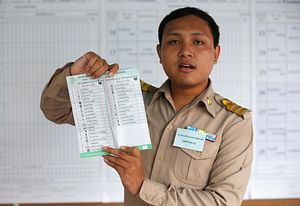Thai election authorities on Thursday ordered a recount of votes and new elections in some polling areas after finding irregularities in last month’s general election.
The Election Commission said in a statement that it had ordered a recount for two polling stations and new elections at six polling stations due to the number of voters not matching the number of ballots in the March 24 vote.
The commission has come under heavy public criticism over its alleged mismanagement of the nation’s first poll since a military coup in 2014. It was mainly accused of releasing delayed and inconsistent results. Thursday’s orders were the first actions it has taken since the election to rectify problems or address complaints and protests. It has said it has received more than 100 protests, but it is not clear how many have been handled so far.
The commission also has the power to disqualify winning candidates, and there is concern that if it exercises that right, it could substantially affect the final certified vote totals that are due to be released on May 9. The preliminary totals gave no single party an absolute majority, so disqualifying candidates and parties could determine whether parties favoring Thailand’s current military government, or those opposing it, will have a majority in the House of Representatives.
The recount involves two polling stations in the northeastern province of Khon Kaen, and the new elections will be held at polling stations in Yasothon in the northeast, Lampang, Phetchabun and Phitsanulok in the north, and the capital Bangkok.
Sawaeng Boonmee, the commission’s deputy secretary-general, said the date for the new voting will be announced later, but it will likely take place after Thailand’s New Year’s holidays in mid-April.
Voting irregularities aside, the election was controversial because the junta that took power after the coup granted itself to rewrite the country’s laws, including commissioning a new constitution and creating an electoral system that severely disadvantages parties without links to the military.
The election was for 500 seats in the lower house. Of those, 350 seats are set aside for the winner of each constituency, while another 150 so-called party list seats are divided among parties based on a proportion of the overall vote derived from a complicated formula.
The recounts and new elections for the eight polling stations are unlikely to drastically affect the results of the elections, which included around 90,000 polling stations, but Sawaeng said it may affect the allocation of the number of party-list seats “because we don’t know who has how many votes yet.”
Kaweewit Kaewjinda for the Associated Press.

































